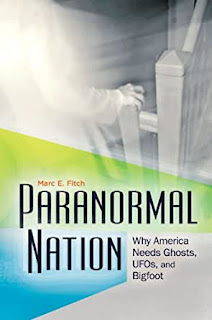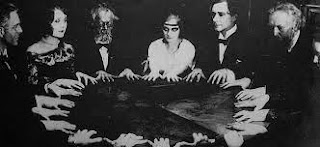Research Blog #9: Argument and Counterargument
This is my argument:
The use of gadgets like EMF (electromagnetic frequency) readers and audio recorders to capture EVPs (electronic voice phenomenon) allows ghost hunters to falsely present their findings as scientific, and the prominence of paranormal media reinforces this misunderstanding. This representation of ghost-hunting technologies, as a result of the “naturalizing” effect, incorrectly legitimizes paranormal investigations and tricks people into trusting the flimsy evidence that such technologies provide. The general public’s lack of scientific understanding makes them susceptible to this misconception, thus perpetuating a belief in paranormal existence.
These are my research questions:
In what ways do ghost hunting technologies falsely legitimize the scientific aspect of the paranormal? How does the media (i.e., paranormal programming) perpetuate these misunderstandings?
Ghost hunting technologies make the paranormal seem scientific as a result of the “naturalizing” effect; basically, when investigators and the media treat such gadgets as scientific tools that capture hard evidence of ghosts, they end up tricking viewers into believing that paranormal existence can be proved with science. Paranormal programming has been able to perpetuate these misconceptions by drawing in curious viewers who want to believe in the paranormal. These viewers project their desires onto the ghost hunting shows that they watch, which then reaffirms their desires as plausible and even scientific. This feeds people’s fascination and belief in the paranormal, which pushes them to consume even more paranormal media.
One source that I can use for my counterargument is Heather Ridolfo’s “Social Influences on Paranormal Belief: Popular Versus Scientific Support.” Here is the bibliographical information:
Ridolfo, Heather, et al. “Social Influences on Paranormal Belief: Popular Versus Scientific
Support.” Current Research in Social Psychology, vol. 15, no. 3, Center for the Study of
Group Processes, 2010, pp. 33–41, https://crisp.org.uiowa.edu/sites/crisp.org.uiowa.
edu/files/2020-04/15.3.pdf
The counterargument here is essentially that paranormal belief does not need to be seen as scientific in order to be believable; rather, as long as paranormal belief is seen as “popular” among the masses, people will be more inclined to accept the idea of ghosts. Here, I want to argue about how social influence may actually play a larger role than so-called “scientific” evidence of paranormal belief. Instead of disagreeing with my counterargument, I would actually like to concede to it. The “naturalizing” effect mostly impacts people who want to trust science, while social influence has a greater impact on those who may distrust science. Then, I would like to argue that the “naturalizing” effect from my original argument can be seen as an extension of social influence towards a different audience, as the “naturalizing” effect relies on the words or suggestions of other people.


Comments
Post a Comment